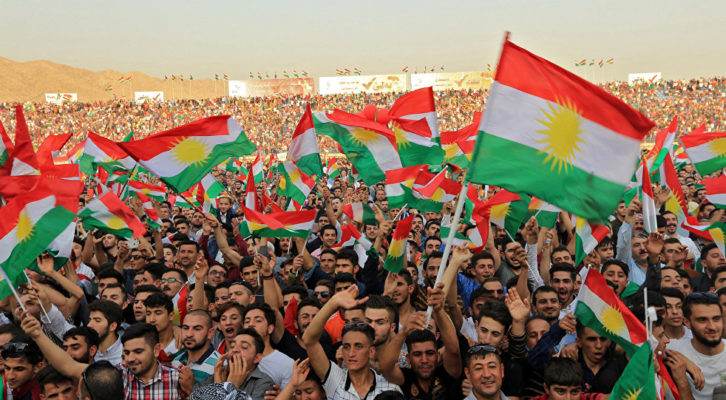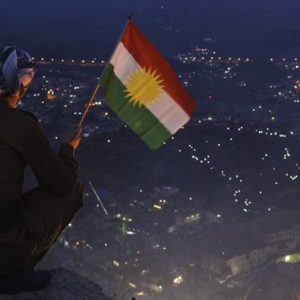Following WWI, a number of key Arab figures and tribesmen who had joined the Allied war effort took over the administration of former Ottoman territory in what is today’s Syria and Jordan. Led by recently coronated King Faisal of the Hashemites, they proclaimed the Arab Kingdom of Syria in Damascus on 1920 and hoped to include the greater Levantine area under one self-administered kingdom. Despite this, the Allies broke their promise of supporting Arab independence, and the French legion swiftly invaded and occupied the nascent country. Yousuf al Athma led the suicidal Battle of Maysaloon against the French, dated July 24, 1920. With his blood, al Athma ensured the French would never legitimize their dismemberment of the nascent nation. Other concurrent revolts against the French occurred, led by Sheikh Saleh al Ali in the Syrian coast and Ibrahim Hanano in the north. These heroic stories of resistance are etched into the collective memory of Syrians and Arabists as founding myths that legitimate the modern Arab nation.
But the Arab kingdom was not the only nascent state crushed by the former allies. Identical developments were occurring in Iraq, not just among the Arab tribes, but the Kurdish ones as well. Although the Kurds lacked notable movements that joined the Allies against the Ottomans, their aspirations for self-rule were no less pronounced in the vacuum that the Kurdish mountains near Mosul found themselves in. One Sheikh Mahmud Barzanji led his first revolt against the British beginning in 1919, after accusing them of breaking their promise of granting the Kurds an independent state. It was during these many revolts where Winston Churchill infamously said he does not oppose utilizing poison gas against “uncivilized tribes”, though whether it was followed through remains in dispute. More than two decades before Guernica, the Royal Air Force had begun a campaign of “aerial policing” over rebellious villages across Iraq. Despite these setbacks, Barzanji continuously negotiated with and rebelled against the British multiple times, finally declaring the Kingdom of Kurdistan from Suleimaniyya in 1922. This state was not fated to survive either, and Iraqi Kurds were doomed to seven decades of life under a very hostile Baghdad government. The British were the Kurds’ only insurance against annexation by the irredentist tendencies of Kemalist Turkey, but they were also the destroyers of their self-rule, and as it would turn out, their worst enemies would come not from Ankara, but from Baghdad.
The Kurds never gave up their campaign for autonomy. Newly armed uprisings erupted against the military government of Abdul Karim Qassim in 1961, and again against the Baathist regime of Saddam Hussein in 1974. The Kurdish movement, now led by Mustafa Barzani, received support from a number of states hostile to Iraq out of pragmatism, like every national and liberation movement did. The reaction of the Iraqi government, particularly after the Baathist took power, was horrific. Following 1975, hundreds of villages were burned down, thousands of Kurds were interned, and hundreds of thousands were deported. Kurds saw their chance again during the Iran-Iraq war, rising up on 1983, to which the regime initially responded by rounding up 8,000 males from the Barzani clan, who were never heard of again. By the time the war was closing in 1988, however, Saddam Hussein’s forces launched Al Anfal Campaign – the most systematic act of genocide in the Middle East since 1915. Up to 182,000 Kurds lost their lives during the assault which brought the number of razed villages since 1975 to over 3,000. The infamous mustard gas attack on Halabja claimed 5,000 lives, an attack that the UN did not explicitly blame on the Iraqi government due to American hostility to Iran. Following the Gulf War during which Kuwait was liberated, the Kurds launched their final uprising in 1991, along with Shiite Iraqis in the deep south. Once again the Saddam regime responded with indiscriminate brutality claiming tens of thousands, yet this time unlike in 1988, Saddam had badly fallen out of favor with the West, leading to the 12-year no-fly zones established over north and south Iraq. Although the south had fallen back under Saddam’s control, most of the north has remained under Kurdish self-rule ever since.
Despite the removal of Saddam and the ascension of his former victims to the seat of power in Baghdad, the Kurds still face a lack of recognition from both Iraq and the wider Arab street. Although running a state within a state in a federal stature since 2003, they are legally bound by the Iraqi government in international and economic matters, including the exportation of oil located within Kurdish Regional Government boundaries. Due to massive corruption and authoritarian repression, the central Iraqi government has been perpetually dysfunctional and reeling from successive insurgencies, the most recent of which has been the loss of one-third of the country to Daesh. The Iraqi government became unable to pay the allocated budget to the KRG, leaving the KRG to fend for itself in fighting Daesh, paying for the accommodation of refugees, as well as managing state and economic affairs.

FILE PHOTO: Kurdish Peshmerga forces celebrate Newroz Day, a festival marking spring and the new year, in Kirkuk March 20, 2017. REUTERS/Ako Rasheed/File Photo
It’s hard to imagine a more compelling case for secession than Bashur – the southern region of the Kurdish homeland spread along four countries. Southern Kurdistan has historically been the most autonomous, had the most governance vacuums, and had the most horrific persecution. By contrast, it has managed to build a largely stable statelet, a rarity at the sub-state level in the Middle East. If the collective memory of Arab resistance against colonialism and imperialism serves to justify our independence today, then it can only be equally true for the Kurds – who were likewise conquered by the British, and forcefully annexed into the neighboring state of Iraq. It is not hard to imagine why a self-conscious ethnic group would resent being ignored and assimilated into a political system it never consented to. It is not hard to imagine why they’d receive support from the enemies of Arabs when the ones oppressing them were themselves Arabs. It is not hard to say that the authoritarianism and corruption of Kurdish strongmen like Massoud Barzani and Jalal Talabani, or the disputes over mixed territories in Ninwa and Kirkuk, are valid concerns to be addressed. However, these are concerns to be addressed between equals, and not between a subordinate nation addressing its overlords. The Kurds do not exist solely to fight the Americans’ wars, as their statements imply. The Kurds fight Daesh because they are protecting their homeland. Only when regional and international players recognize the Kurds as independent equals will the first step towards lasting stability have been taken.







